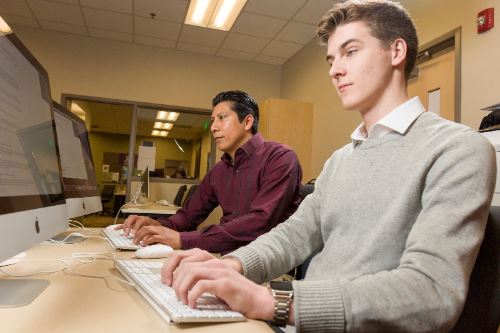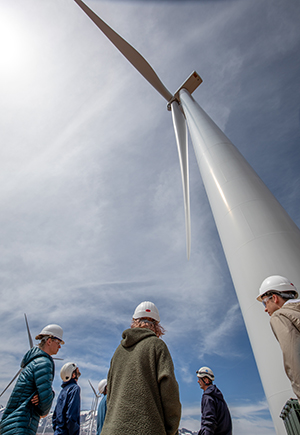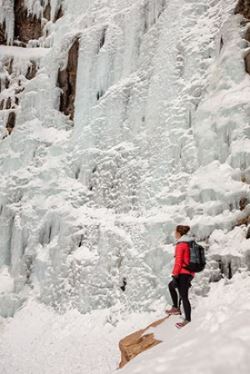Weber State Offers New Degree Options Beginning Fall Semester
OGDEN, Utah – When Weber State Wildcats head back to school this fall, they will find a number of new degrees and programs to energize their academic pursuits, including a new bachelor’s degree in energy engineering.
 The degrees are offered in a wide range of disciplines, everything from advanced certificates to a master’s degree in social work. The programs were created to meet industry demand in specialized fields. Weber State offers more than 225 degrees and programs. The new courses of study include:
The degrees are offered in a wide range of disciplines, everything from advanced certificates to a master’s degree in social work. The programs were created to meet industry demand in specialized fields. Weber State offers more than 225 degrees and programs. The new courses of study include:
- Master of Social Work
- Bachelor of Science in Energy Engineering
- Bachelor of Science in User Experience; emphasis areas in Stack Web Development, and Design
- Bachelor of Arts in Geography
- Associate of Applied Science in Outdoor Leadership
- Associate of Science in Sound Production/Recording
- Associate of Applied Science in Physical Science
- Five new certificates in business, engineering and cyber security
Four of the certifications are for individuals who have earned a bachelor’s degree in the field. All are part of Utah’s Learn & Work educational initiative, which provides scholarships for students who enroll in the certification courses.
“The new areas of study will add to a wide array of options for our students and will increase their employability,” said Ravi Krovi, WSU provost. “These offerings are designed to meet the labor demands of the post-pandemic economy and will fill critical workforce gaps in the STEM, business and social science disciplines.”
Consistent with Weber State’s focus on sustainability, the new energy engineering program, housed in the College of Engineering, Applied Science & Technology (EAST), will educate engineers to design the most efficient, sustainable and cost-effective ways to operate buildings, power plants and manufacturing processes. As one of the more recent engineering fields to emerge, energy engineering combines the fields of mechanical engineering, electrical engineering, environmental science and economics. According to data from the Department of Workforce Services, graduates can expect a median salary in Utah of $89,700.
High demand, high-paying jobs are the driving force behind the many new degrees and certificates offered in EAST.
“We are creating degrees, like systems engineering and energy engineering, that represent our community’s needs,” said David Ferro, dean of the college of EAST. “The salaries in these areas are much higher than average as well. We welcome anyone who wants to create solutions for wicked problems and have fun while doing it.”
 Elaine Cope is a 2017 manufacturing engineering technology graduate and Northrop Grumman engineer. She returned to Weber State to earn the post-baccalaureate certificate in systems engineering and sustainable engineering with an eye to a future Master of Science in Systems Engineering, which is in the review process now.
Elaine Cope is a 2017 manufacturing engineering technology graduate and Northrop Grumman engineer. She returned to Weber State to earn the post-baccalaureate certificate in systems engineering and sustainable engineering with an eye to a future Master of Science in Systems Engineering, which is in the review process now.
“I used the certificate as a ‘Try before I buy’ to make sure that I really loved systems engineering — and I did,” Cope said. “Weber State has very hands-on learning. They teach the theory as well as how to write the processes and the procedures to quickly work through problems and get parts into production.”
Post-bachelor’s certificates have become a popular option because in the tight labor market, employers are trying to help develop the skills they need with the employees they have.
High demand is also why Weber’s State College of Social & Behavioral Sciences created the new Master of Social Work (MSW).
According to Mark Bigler, professor and chair of the Department of Social Work and Gerontology, the program will focus on clinical social work practice and spend more time training students to provide therapy than the generalist programs do.
“We wanted to be unique. That’s certainly part of the reason we chose a clinical emphasis,” Bigler said. “It gives graduates from our master’s program a bit of a leg up in a growing area of demand.”
“The program’s clinical focus was also determined in collaboration with community partners,” Bigler said, who report facing significant difficulty filling clinical positions that require a master’s level credential in the field.
Weber State already has a thriving undergraduate program, which produces 50-75 social workers each academic year, providing a solid foundation for a master’s program.
Undergraduate students interested in science, will have additional flexibility to find their focus with the new Associate of Applied Science in Physical Science.
The degree in physical science is designed as a stackable credential. Upon completion, students are prepared to either enter the job market or continue on to a bachelor’s degree in chemistry, physics, or earth & environmental sciences.
“Students will have a diverse array of science career options available to them including laboratory technician, chemical technician, geological technician, environmental technician or research assistant,” said Andrea Easter-Pilcher, College of Science dean. “Students who choose to pursue a bachelor’s degree in any of the physical sciences can complete that degree in an additional two years.”
The new degrees and certificates support Weber State’s dual mission to provide educational steps, so students have flexibility to earn certificates and advance from associate to bachelor’s to graduate degrees easily and efficiently.
“The innovations in our curriculum reflect a continued commitment of Weber State University to offer in demand programs in collaboration with industry and community partners,” Krovi said.
Students interested in Weber State still have time to enroll for the fall semester, which begins Aug. 30. For more information visit weber.edu/registration.
For catalog information about the new courses, visit these links:
 Master’s
Master’s
- Bachelor’s
- Associate’s
- Certificate
- Post-Baccalaureate Certificate in Cyber Security
- Certificate of Proficiency in User Experience Design
- Post-Baccalaureate Certificate in Systems Engineering and Sustainable Engineering
- Post-Baccalaureate Certificate in Business Analytics
- Post-Baccalaureate Certificate in Business Development
Visit weber.edu/wsutoday for more news about Weber State University.
Allison Barlow Hess, Public Relations director
801-626-7948 • ahess@weber.edu